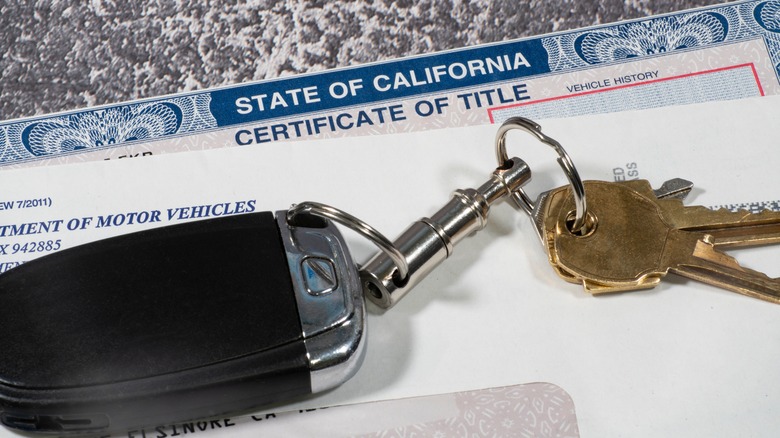What Is 'Title Jumping' And Why Is It Illegal In Every State?
If you're buying or selling a car, there are certain legal steps that need to be adhered to. One way that unscrupulous sellers — and sometimes buyers — flout the law is a practice known as "title jumping," which occurs when a vehicle is sold without the car being legally registered in the seller's name. While this practice is usually associated with dealers, the law applies to any individual or company that sells a vehicle without transferring the title into their own name first. This might sound like a persnickety paperwork exercise, but it can be more serious than that.
For unlicensed dealers, this makes it easier to commit fraud. For the buyer and genuine sellers, it can lead to legal problems. The law exists so that each vehicle has a paper trail that is transparent and accurate. Title skipping lets sellers avoid paying taxes and fees, and can also leave the original seller liable for the car. This is why the practice is illegal in every U.S. state and can be treated as a fraudulent act punishable with criminal charges. It also demonstrates why it's important to understand the ins and outs of transferring a car title. There are plenty of scams to avoid when buying a car, and title jumping can certainly be considered a potential one.
Title jumping explained
Title jumping occurs when a car is sold without it first being registered in the seller's name. It doesn't matter if you buy the car one day and intend to sell it the next day; it still needs to be registered in your name before it's sold. There are solid reasons for this law, and failure to abide by it can lead to ramifications on both sides of the transaction. For the buyer, it can result in them being unable to insure or sell the car. However, this isn't the end of the matter. In some cases, the buyer could be liable for any unpaid taxes or liens associated with the vehicle. In the worst cases, the non-payment of previous loans on the car could result in the car being repossessed. While the law may ultimately find in the buyer's favor, nobody wants to go through all that hassle.
For the seller, the most obvious ramification is that they're breaking the law. This could lead to penalties, fines, and even imprisonment. In one case, a New York dealership that had failed to properly and timeously complete the title transfer was ordered to pay $7,438 in damages to the vehicle's buyer. For both buyers and sellers (at least legitimate sellers!), this is why it's important to understand how title jumping works. However, more importantly, it can help you avoid becoming a victim of title jumping.
Avoiding the pitfalls of title jumping when buying a car
Finding precise numbers about the prevalence of title jumping is difficult. However, the U.S. Department of Justice reported that in the first six months of 2008, there were 185,000 instances of titles being moved from one state to another in order to generate a clean title. Although not strictly title jumping, it does demonstrate the scale of title-related fraud and how easy buyers can find themselves in the middle of it.
There are several steps that can be taken to minimize the risk. The first thing to do is to check the name on the title of a car you're looking at and make sure that it matches their ID. Also, don't buy if the seller declines to sign the title. If you're buying a car from a dealer, then some due diligence is required to confirm that it is properly licensed. There are also online resources that can give you a title history for the vehicle.
The National Motor Vehicle Title Information System website lists various approved data providers that can give you the history of any vehicle. You'll need to locate your vehicle's VIN number to do this. Of course, if a sale goes through, it's also important that you immediately register the vehicle in your name. This establishes legal ownership and prevents you from becoming an unwitting "title jumper" with the potential consequences that accompany it.


